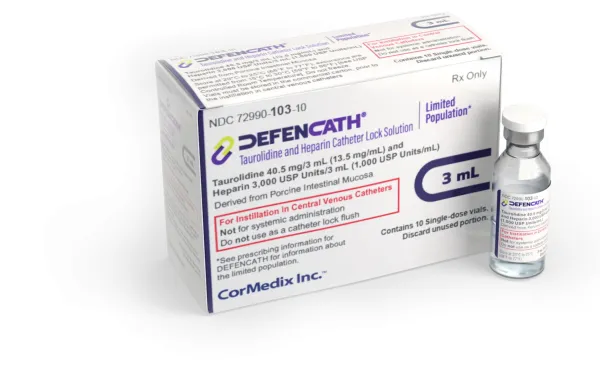DefenCath Side Effects
Generic name: heparin catheter lock solution / taurolidine catheter lock solution
Note: This document provides detailed information about DefenCath.
Applies to heparin catheter lock solution / taurolidine catheter lock solution: intraluminal solution Side Effects associated with heparin catheter lock solution / taurolidine catheter lock solution. Some dosage forms listed on this page may not apply specifically to the brand name DefenCath.
Applies to heparin catheter lock solution / taurolidine catheter lock solution: intraluminal solution.
General adverse events
The most common adverse effects occurring in 2% of patients or greater included hemodialysis catheter malfunction, hemorrhage/bleeding, nausea, vomiting, dizziness, musculoskeletal chest pain, and thrombocytopenia.[Ref]
Gastrointestinal
- Common (1% to 10%): Nausea/procedural nausea, vomiting/procedural vomiting
Hematologic
- Common (1% to 10%): Hemorrhage/bleeding, thrombocytopenia
- Uncommon (0.1% to 1%): Heparin-induced thrombocytopenia
Hemorrhage/bleeding includes hematoma/hemorrhage, intracranial hemorrhage, arteriovenous graft or fistula site hemorrhage, catheter site hematoma/hemorrhage, cerebral/cerebellar hemorrhage, eye/conjunctival hemorrhage, gastrointestinal hemorrhage, hematuria, hemobilia, hemoptysis, renal hematoma, and vaginal/uterine hemorrhage.
Hypersensitivity
- Uncommon (0.1% to 1%): Drug hypersensitivity
Metabolic
- Frequency not reported: Hypocalcemia
Musculoskeletal
- Common (1% to 10%): Musculoskeletal (non-cardiac) chest pain or discomfort
Nervous system
- Common (1% to 10%): Dizziness
- Frequency not reported: Dysgeusia
- Postmarketing reports: Paresthesia
Other
- Very common (10% or more): Hemodialysis catheter/device malfunction (17%), use of thrombolytic agent (16%), catheter removal (12%)
- Common (1% to 10%): Catheter removal without thrombolytic agent use
See also:
References
1. (2024) "Product Information. Defencath (heparin-taurolidine catheter lock solution)." CorMedix
More about DefenCath (heparin catheter lock solution / taurolidine catheter lock solution)
- Compare alternatives
- Pricing & coupons
- Drug images
- Dosage information
- During pregnancy
- FDA approval history
- Drug class: miscellaneous antibiotics
Patient resources
Professional resources
Related treatment guides
Further information
DefenCath side effects can vary depending on the individual. Always consult your healthcare provider to ensure the information displayed on this page applies to your personal circumstances.
Note: Medication side effects may be underreported. If you are experiencing side effects that are not listed, submit a report to the FDA by following this guide.

